‘I’m never bored’: Willem Dafoe on art, yoga – and alpacas
Willem Dafoe has made more than 150 movies, but in a forced break from filming he leaned into a new role. He talks about art, his new film Poor Things – and gentleman farming
Rebecca Nicholson
Sunday 7 January 2024
Willem Dafoe is in his apartment in New York, where he is watched over by two works of art. Behind him is an oil painting of his father, a prop created for a film, which required “dynastic portraits” of his relatives. “I liked my father fine, so, there he is.” We are talking on Zoom and he spins the camera round. “But look, even better! Here’s the counterpoint. Do you see that?” To the side of him is a large, lightbox photograph of his friend and occasional collaborator, the artist Marina Abramović, standing priest-like over a naked body adorned with organs. “Anyway, you get the idea,” he says.
Dafoe is less the kind of actor who wants to discuss his three-hour morning workout routine and more the type who will get stuck into the bigger stuff. We are here to talk about Poor Things, the stunning new Yorgos Lanthimos film, based on the novel by Alasdair Gray. Dafoe stars as a reclusive genius scientist named Godwin Baxter – God, for short – who creates life in the form of Emma Stone’s Bella. It is a gorgeous, thrilling adventure and it could be the film to earn Dafoe, who slaps on heavy prosthetics to play God, his fifth Oscar nomination. His first was for Platoon, in 1987, and he has been working solidly, voraciously even, since 1980, making more than 150 films in five decades, with every interesting director in the business, from David Lynch to Wes Anderson, from Werner Herzog to Paul Schrader and Martin Scorsese.
Dafoe, 68, is back in New York only briefly. He first moved to the city in 1977, when he was 22, because he wanted to be a commercial theatre actor, but he fell in with an arty crowd and joined an experimental theatre collective called the Wooster Groupinstead. It was there he met his first partner, with whom he had a son in 1982. He’s lived in New York on and off since then, though less so now. In the early 00s, he married an Italian woman, the director Giada Colagrande, 48, with whom he now lives in Rome. “It’s almost like I go back to a different life than I have normally,” he says. He has Italian friends, Italian family, speaks Italian. And then there are the animals.
We were due to speak in the summer, but Poor Things was pushed back due to the actors’ strike, which also meant that Dafoe stopped working for almost four months. “I love to work,” he says, “and it was longer than I like to go.” But it was fine, mostly, because of his small farm. “I never know how much to talk about this,” he says, a little warily. “Basically, let’s say, I was a gentleman farmer.”
I am sure I am not the only one who would like to know more. “Oh, OK. Well, maybe you’ll get a little out of me.” Dafoe had never even had pets before, but now, he has “lots of animals” and a vegetable garden, just outside Rome. Why does he keep animals? “I’m basically a vegetarian, so I do it just for the pleasure of their company and to try to give them a good life, which is a little naive.” They take eggs from the chickens and turkeys, and wool from the sheep and alpacas. At one point he refers to “other people” on the farm. “Did you hear that?” he says, catching himself. “Other people!” He means the animals.
A few months ago, Dafoe’s Poor Things co-star Mark Ruffalo posted a picture of the two of them with an alpaca, which briefly lit up the internet. So that was your alpaca? He nods. “A baby. They’re beautiful.” Do they have personalities? “Yeah, that’s the whole thing. Each one is very distinct. With sheep and goats, some you know well, some have names and they really stick, but some are just sheep and goats. But every alpaca, you have a whole particular relationship with, and you know their character.”
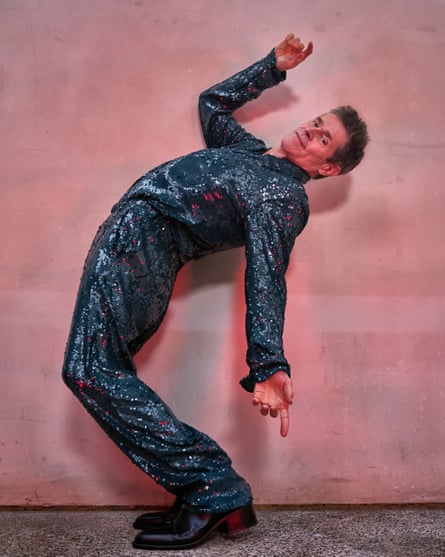
The gentleman farmer sounds like a very different lifestyle to either Hollywood or the New York theatre scene. “It is, but still, it’s like being at the theatre. I wake up, I hit the ground running. My day is dedicated to doing things and taking care of things. Idle hands are the devil’s workshop, what can I tell ya?” He grins. “Another reason I don’t like to talk about it is, I remember one of the first movies I was in.” It was called Heaven’s Gate, in 1980. “I had never been in a studio or Hollywood movie before. I was used to being with the downtown crowd in New York, in a very fertile period. When I went on set, I thought everybody would be talking about poetry and film and philosophy. And everybody was talking about their dogs and their horses and their ranches, and I thought, this is a drag, ya know? And now, I’ve become one of them.”
Dafoe has always existed between the mainstream and an artier scene, adjusting the balance over the years. There has been much mythologising of New York City in 1977. Was he part of that world? “I was very much there, but we also were kind of insular, in the respect that it was a tough life and it was hard to survive. We didn’t have the money to hang out at Max’s Kansas City all the time. You would go to CBGBs, you’d go to Mudd Club, but it wasn’t a regular thing.”
When he first arrived, he was fresh from touring Europe with a travelling theatre company, and he thought he would become a professional stage actor. “But I found myself not being interested in pursuing that and hanging out with people that had very little ambition. Not until later did people really become kind of careerist about it. Because there was no career to be had, there was no audience for it.” Clearly, he has had a long and successful career himself. Was there snobbery around the idea of success? “Of course. Because grabbing at the brass ring – the brass ring was bullshit, you know? Why grab? Make our own brass ring. I think there was some truth to that.”
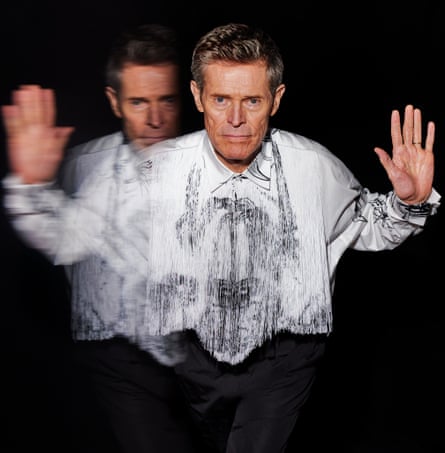
Dafoe has worked with scores of directors, many of whom have used him to challenging effect, whether in the psychosexual horrors of Lars von Trier or the earthy folk terrors of Robert Eggers; he has played Jesus Christ, starred in Antichrist. But he has done plenty of blockbusters in his time, from Speed 2 to Spider-Man. If it doesn’t sound rude, I say, you have sort of grabbed at the brass ring, too. “Yeah, and listen, I’ve been very fortunate. But I do want to say that I’m always amazed when people have some success and they’re kind of in denial, and still treat themselves as outsiders.” He laughs. “I find that kind of rude. I don’t want to be that guy.”
I want to know what Dafoe thinks about the movies today. He has pointed out before that when he did Spider-Man, in 2002, it was an anomaly: movies weren’t really made from comic books then. Now, superheroes dominate and many argue that between the blockbusters and the arthouse, there’s no middle ground left. At first, he demurs and says he doesn’t really think about it, because, as always, he’s too busy working. But then he warms up. “When something like the strike happens, I wake up and say, ‘Listen, baby, you got to figure some of this stuff out,’ because otherwise you’re driving blind, you know?”
Listen, baby, this is what Dafoe has figured out. The easy one, he says, is that people watch films differently now, at home, rather than at the cinemas, which are closing down. “Which is tragic, because the kind of attention that people give at home isn’t the same. More difficult movies, more challenging movies can not do as well, when you don’t have an audience that’s really paying attention. That’s a big thing. I miss the social thing of where movies fit in the world. You go see a movie, you go out to dinner, you talk about it later, and that spreads out. People now go home, they say, ‘Hey, honey, let’s watch something stupid tonight,’ and they flip through and they watch five minutes of 10 movies, and they say, forget it, let’s go to bed. Where’s that discourse found?”
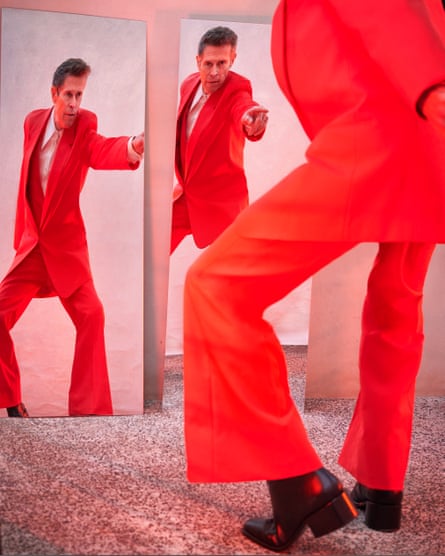
The studios have changed, too. “They aren’t making movies the same way they used to. They’re being financed by toy companies and other entities, and they become the vehicle to make the movies, because they know how to do that. Streaming, they’re becoming like a monopoly, they have the means of production and distribution. And so it’s very complicated.” He says again that he doesn’t really know anything, that his friends who work in Hollywood more know better than him. “I’m a crummy source, a lousy source, to have a really good overview on what has changed.”
It sounds like he has a good overview to me. “Just socially,” he says, “but I don’t really know the business part of it. I just noticed that there’s been a proliferation of middlemen. There aren’t ballsy producers like there used to be. There are some savvy ones, but you don’t have the same kind of characters that you used to have, that would sell their house to make a movie, and do crazy things to get it done. They’re a little harder to find.”
Dafoe always has several projects on the go. Another of the films he made recently is Gonzo Girl, Patricia Arquette’s directorial debut, which sees him playing one of those crazy types, not a producer, but a Hunter S Thompson-esque writer, whose creativity has long since been subsumed by excess. He has a different name, but is very much based on Thompson. “Of course, we borrow a lot from the real-life character, but I never wanted to do an imitation. That’s why biopics that try to do an imitation always drive me crazy, because it ultimately becomes a show of the actor. Somewhere that embarrasses me and repels me. Really. And the actors that repel me are ones that are too needy.”
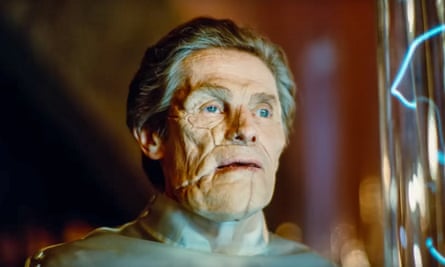
In an industry stuffed with inflated egos, then, it sounds as if Dafoe’s ego is pretty healthy. “I hope what you say is true,” he says. “Of course, we need an ego to get out of bed. To want to do things, we have to have some sense of self. But we don’t want to delude ourselves to think that we’re one thing, to be inflexible, to think that we’re special.”
Is he a spiritual person? “Oh, God,” he says, mock-appalled, but he indulges the question. “Listen. I’m interested in spiritual impulse, and I’m interested in religious thought, but you can’t talk about these things publicly, and you shouldn’t talk about them, because then you fall into the trap of making that your identity.”
For example, he’s been doing yoga for 40 years and sometimes it comes up in interviews. It’s a big part of his life. “But I don’t like to talk about it, because every time you bring it up, if someone doesn’t have the same reference, you’re kind of saying, you’re missing out, you don’t have it, this is a beautiful thing for me, and then you just want to kill yourself! For being an asshole!”
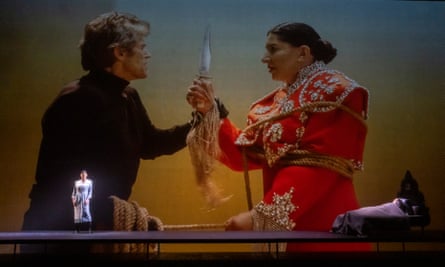
Is it better, as an actor, to have people know nothing about you? “I think that’s true. I know that when I know someone has really repellent politics, it changes how I watch them.” When he is talking about Poor Things, he is often asked about the prosthetics. “The second I hear myself saying, ‘Yeah, it took four hours to get in and two hours to get out, and I was there at 3am…’ You don’t want people thinking about that when they’re watching the movie.”
I wonder if Dafoe, with his 150-plus movies and his theatre and his art and his alpacas, is easily bored. “Not at all!” he replies, immediately. “I’m never bored. In fact, it’s probably the greatest feature of getting older. When I was younger, I was bored and restless a lot. I always have things I want to do and there aren’t enough hours in the day.” This sounds like a nice state to live in. “It’s only come as I’ve gotten older and other things have gone as I’ve gotten older, and it’s a good trade-off, I’d say.”
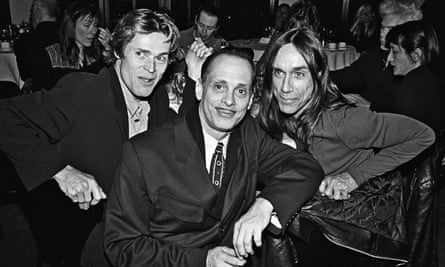
What has he lost? “Not much, you know, maybe a little muscle tone and thickness of eyebrows and your lips get thinner. No, I’m joking, but I’m not joking…” He laughs. “When you’re younger, it feels like an open road much more. Once you get further down the line, you start to think about the under-the-line a lot more.” He used to be the youngest person in every group. “Now I’m the oldest. I read all the time about people I’ve worked with dying, and it’s like, what happened? And it’s like, well, they were 82 years old,” he says. Younger people are often motivated by a need to find their place in the world. “I think it’s no accident that there are different stages of life and I don’t have a preference for one or the other, but not everything has to happen when you’re young. A lot can happen later.”
It sounds as if Dafoe has never been busier. He is about to start work on another film, with the former associate director of the Young Vic, Nadia Latif. He has already finished another film with Lanthimos and Stone. And then there is Beetlejuice 2. A couple of days earlier, Dafoe had let slip that he is playing an undead detective. “Do me a favour,” he says, annoyed at himself. “I said this two days ago, and I regret it, because it occurs to me that Tim Burton is probably one of those people who doesn’t like people to talk about the movie. I think he probably thought, ‘That fucker, he should have kept his mouth shut!’”
He laughs. “I had a weak moment, ya know! I spilled the beans, as they say.”
Fashion editor Helen Seamons; grooming by Jennie Roberts at Frank Agency using Woolf Kings X and Glossier; Fashion assistant Sam Deaman; tailor Nick James; photography assistants Alex Cornes, Philip Banks and Brandon Hepworth; shot at Stockwell Studio.
Poor Things is in cinemas on 12 January



No comments:
Post a Comment